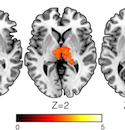Abstract
This fMRI study aimed at investigating how differences in personality traits affect the processing of dynamic and natural gestures containing social versus nonsocial intent. We predicted that while processing gestures with social intent extraversion would be associated with increased activity within the reticulothalamic–cortical arousal system (RTCS), while neuroticism would be associated with increased activity in emotion processing circuits. The obtained findings partly support our hypotheses. We found a positive correlation between bilateral thalamic activity and extraversion scores while participants viewed social (versus nonsocial) gestures. For neuroticism, the data revealed a more complex activation pattern. Activity in the bilateral frontal operculum and anterior insula, extending into bilateral putamen and right amygdala, was moderated as a function of actor-orientation (i.e., first versus third-person engagement) and face-visibility (actor faces visible versus blurred). Our findings point to the existence of factors other than emotional valence that can influence social gesture processing in particular, and social cognitive affective processing in general, as a function of personality.
